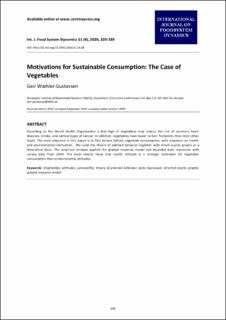| dc.contributor.author | Gustavsen, Geir Wæhler | |
| dc.date.accessioned | 2021-01-26T15:06:21Z | |
| dc.date.available | 2021-01-26T15:06:21Z | |
| dc.date.created | 2020-10-20T12:53:01Z | |
| dc.date.issued | 2020-10 | |
| dc.identifier.citation | International Journal on Food System Dynamics. 2020, 11 (4), 329-339. | en_US |
| dc.identifier.issn | 1869-6945 | |
| dc.identifier.uri | https://hdl.handle.net/11250/2724832 | |
| dc.description.abstract | According to the World Health Organization a diet high in vegetables may reduce the risk of coronary heart diseases, stroke, and certain types of cancer. In addition, vegetables have lower carbon footprints than most other foods. The main objective in this paper is to find drivers behind vegetable consumption, with emphasis on health and environmental motivation. We used the theory of planned behavior together with direct acyclic graphs as a theoretical basis. The empirical analysis applied the graded response model and bounded beta regression with survey data from 2019. The main results show that health attitude is a stronger motivator for vegetable consumption than environmental attitudes. | en_US |
| dc.language.iso | eng | en_US |
| dc.rights | Navngivelse-Ikkekommersiell 4.0 Internasjonal | * |
| dc.rights.uri | http://creativecommons.org/licenses/by-nc/4.0/deed.no | * |
| dc.title | Motivations for Sustainable Consumption: The Case of Vegetables | en_US |
| dc.type | Peer reviewed | en_US |
| dc.type | Journal article | en_US |
| dc.description.version | publishedVersion | en_US |
| dc.rights.holder | © The author | en_US |
| dc.source.pagenumber | 329-339 | en_US |
| dc.source.volume | 11 | en_US |
| dc.source.journal | International Journal on Food System Dynamics | en_US |
| dc.source.issue | 4 | en_US |
| dc.identifier.doi | 10.18461/ijfsd.v11i4.58 | |
| dc.identifier.cristin | 1840869 | |
| cristin.ispublished | true | |
| cristin.fulltext | original | |
| cristin.qualitycode | 1 | |

